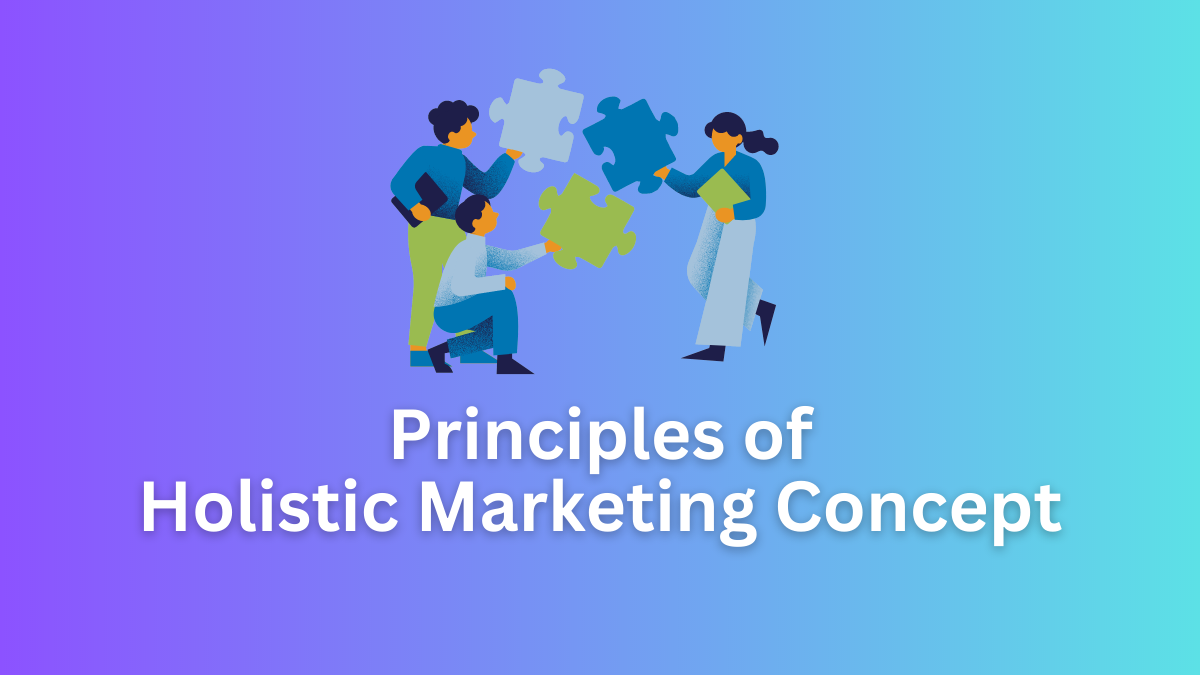Principles of Holistic Marketing Concept
The holistic marketing concept defines the organization as a unified unity, it states the coordinated effort of all organizational elements is the key achieve the desired goals.
Let’s explore the four principles of holistic marketing concept on which the concept is based.
Internal Marketing
The “Internal Marketing” principle within the Holistic Marketing Concept is like nurturing a garden to yield beautiful flowers. It’s about empowering employees, ensuring they understand the company’s goals, and providing them with the tools to excel. Just as a healthy root system strengthens a plant, internal marketing strengthens a business.
Importantly, motivated employees offer better customer service, leading to happy customers. When employees understand and believe in the company’s mission, they become brand advocates. This internal harmony resonates externally, enhancing the company’s reputation and attracting customers.
This principle adds a crucial puzzle piece to holistic marketing. A united workforce translates to efficient operations, consistent messaging, and better customer interactions. Internal marketing cultivates a strong organizational culture, where everyone is aligned, energized, and invested in the company’s success. Just as healthy roots support a flourishing plant, motivated employees support the holistic marketing approach, creating a thriving and unified business ecosystem.
Related: 8 Pros and 7 Cons of Holistic Marketing Concept
Integrated Marketing
The Integrated Marketing principle of the Holistic Marketing Concept is like weaving a colorful tapestry where all threads blend seamlessly. It’s about aligning all aspects of marketing – from product to promotion – into a harmonious narrative that customers easily connect with.
Integrated marketing is important because it ensures a consistent brand message across all channels. Just like a familiar melody sticks in your mind, a unified marketing message sticks in customers’ minds. When your ads, social media, and in-store experience tell the same story, it resonates better.
This principle enhances holistic marketing by creating a harmony of communication. When different marketing components work together, they create a more powerful impact. Integrated marketing aligns the marketing mix – product, price, place, and promotion – resulting in a cohesive strategy that’s more memorable, engaging, and effective.
Relationship Marketing
The Relationship Marketing principle of Holistic Marketing Concept is all about nurturing connections that last. It’s like building strong friendships where trust, care, and understanding are key ingredients.
In business, this principle focuses on developing long-term bonds with customers, employees, stakeholders, and more. It’s important because loyal customers become brand advocates and trusted employees become brand ambassadors. Just like in a close-knit community, relationships build the foundation of success.
Read Also: 10 Importance of Holistic Marketing Concepts
This principle adds depth to holistic marketing by emphasizing lasting connections over one-time transactions. When customers feel valued and heard, they stay loyal. When employees feel appreciated, they work passionately.
Building strong relationships enriches the holistic approach, creating a positive cycle where satisfied stakeholders contribute to the company’s long-term success. It’s like tending to a garden – with care and attention, it flourishes and bears fruitful results.
Performance Marketing/Socially Responsible Marketing
The Socially Responsible Marketing principle is the last of the 4 principles of Holistic Marketing Concept is like being a good citizen while excelling in school. It’s about not only achieving goals but also doing so responsibly.
Related: Societal Marketing Concept
This principle focuses on two aspects. Firstly, it’s about making sure marketing efforts bring in good returns – measurable results that show the effort is paying off. Secondly, it’s about considering the impact on society and the environment. Just like a responsible student thinks about their actions’ effects on classmates and the school, this principal considers the bigger picture.
It’s important because it ensures the company isn’t just chasing profits but also contributing positively to the community and environment. By doing good, the company builds a reputation for being ethical and trustworthy, which resonates with customers.
This principle adds depth to holistic marketing by balancing success with responsibility. It’s like hitting two birds with one stone – achieving goals and being a positive force in the world. This responsible approach enhances the holistic strategy, creating a win-win scenario where the company flourishes while making a meaningful impact.
Read Next: Selling Concept Vs. Marketing Concept: 12 Differences
Arti Kushmi holds a BBS (Bachelor in Business Studies) degree and shares her business and marketing knowledge through this website. While not writing she will be reading and enjoying the moment.
